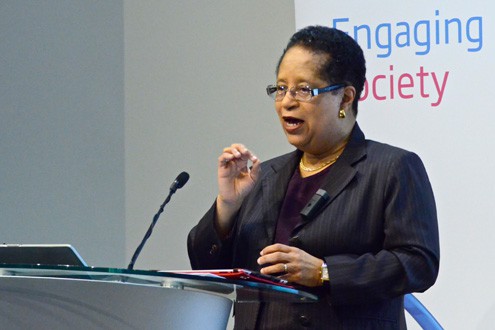
How do you tackle the world’s biggest problems such as making sure everyone has enough food, clean water, a secure energy supply and access to proper medicine and healthcare?
According to Shirley Ann Jackson, president of Rensselaer Polytechnic Institute in the US, the answer lies in a novel kind of research endeavour, which she dubs “the new polytechnic”.
Speaking at the 2013 ERA Foundation international lecture at the Royal Academy of Engineering in London last night, Jackson spelled out the principles of such an endeavour, which would essentially involve bringing researchers from different subjects, countries, cultures and sectors together to work on important multidisciplinary problems.
Exploiting computer technology, the Web and big data sets would be the key to tackling such challenges, she reckons.
Jackson, who trained as a particle theorist and is also a member of Barack Obama’s science advisory council discussed three interesting fields that, she thinks, could – indeed, already do – benefit from such an approach. They are using tissue-regeneration techniques to heal injured patients, incorporating solar panels and other forms of energy-saving devices into buildings, and exploiting the “data trails” we leave when we use social media.
I found Jackson a polished speaker, no doubt honed by her years in top positions in the US. Apart from being one of Obama’s science-policy wonks, she was boss of the US Nuclear Regulatory Commission between 1995 and 1999 and is a former president of the American Association for the Advancement of Science. Before that Jackson was part of the faculty at Rutgers University, spent 16 years at Bell Labs and had spells as a postdoc at Fermilab and CERN. Her impressive CV also includes a string of directorships at the likes of IBM and FedEx.
Jackson was less detailed on the nitty-gritty of setting up her “new polytechnic” or explaining who would fund such an enterprise. Last night was perhaps not the forum for those questions. But to me the elephant in the room was the whole concept of multidisciplinarity itself, which surely can only work if you have strong, vigorous disciplines in the first place. Jackson pointed to the likes of Cardinal Newman as advocates of the need for a broad education as long ago as the mid-19th century, but there are probably very valid reasons why so many of us prefer to hone our talents in a particular discipline and why the goal of multidisciplinarity can be so hard to put into practice.
Jackson hinted that leadership is the key in her new vision, highlighting Nelson Mandela as an example of the kind of bold, visionary thinker who is needed to get her blueprint off the ground. I found Mandela on odd choice given that he is not the first person you would associate with revolutions in higher education, but Jackson was right that managing, leading and encouraging multidisciplinary teams – particularly if they are spread over different continents and different time zones – is crucial.
Next stop for Jackson on her European tour is the World Economic Forum in Davos, Switzerland, this week. Whether she’s got time to pop in on her old haunt – CERN – I’m not sure.



